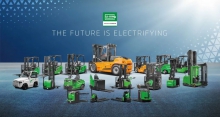As the market for clean alternative fuels grows, warehouse managers have what car buyers haven’t got: vehicles p...
As the market for clean alternative fuels grows, warehouse managers have what car buyers haven’t got: vehicles powered by hydrogen fuel cells. The U.S. Department of Energy is using forklifts to conduct a high priority, detailed study of how hydrogen fuel cells perform in real world conditions. The $93 million project involves about 1,000 units installed in forklifts at a dozen companies that have major warehouse operations. It is part of the hydrogen fuel cell research and development program of the National Renewable Energy Laboratory.
The project is being funded partly by food giant Sysco and other warehouse companies. It also comes under the green jobs initiatives of the federal American Reinvestment and Recovery Act (ARRA), which chipped in $42 million in federal funding, in anticipation of the new jobs that will be created in fuel cell development, manufacturing, maintenance, and technical support. As for why DOE chose the humble forklift for such a major investment in sustainability, read on…
Forklifts as a Sustainable Study Buddy
Forklifts are valuable study tools for a number of reasons. Warehouses have already begun shifting to hydrogen fuel cell forklifts, partly because they perform better than electric-powered lifts, in which batteries have to be changed more frequently. A high rate of efficiency is essential to warehouse management, so every minute of down time counts. Because warehouses operate under strict productivity measures, the data platform is already in place for a rigorous study. In addition to fuel cells in forklifts, the DOE is also studying fuel cells in other early adopters where performance and efficiency are crucial, such as backup emergency power. It’s also worth noting that about 90,000 new forklifts enter the market every year, so reliable data on a significant efficiency improvement could result in a rapid, industrywide shift to hydrogen fuel cells that could ripple into other sectors, including the consumer market.
Fuel Cells and Sustainability
Unlike petroleum engines, which burn fuel, fuel cells create power through a chemical reaction. That means the field is wide open for alternatives, and they are already starting to crop up. For example, low-cost hydrogen fuel cells are in development as researchers find alternatives to the expensive platinum components used in conventional hydrogen fuel cells. In addition, microbial fuel cells based on organic processes are beginning to crop up, in which cheap or even virtually free substances (mud or seawater, for example) provide the feedstock for sustainable energy.















 粤公网安备 44010602003952号
粤公网安备 44010602003952号